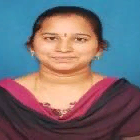
P. Aruna Kumari
Work place: GVP College of Engineering(A), Visakhapatnam, India.
E-mail: hiaruna4u@gmail.com
Website:
Research Interests: Data Structures and Algorithms, Computer Architecture and Organization, Computer systems and computational processes, Computational Science and Engineering
Biography
Ms. P. Aruna Kumari received B.Tech degree in Electronics and Communication Engineering from J.N.T.University, and M.Tech degree in Radar and Microwave Engineering from Andhra University College of Engineering. She has 2 years of Software Industry experience and 13 years of teaching experience and is Assistant Professor of Electronics and Communication Engineering, G.V.P. College of Engineering (Autonomous), Visakhapatnam. Her research interests include Wireless Mobile Communications, Digital Communications and Signal Processing. She registered for Ph.D. from J.N.T.U. Kakinada under the guidance of Dr .I. Santi Prabha. She published technical papers in International conferences and journals.
Author Articles
Signal Propagation Analysis at 28GHz and 73GHz Millimeter Wave bands for Next Generation Networks
By P. Aruna Kumari I. Santi Prabha
DOI: https://doi.org/10.5815/ijigsp.2019.08.02, Pub. Date: 8 Aug. 2019
Fifth generation (5G) mobile networks demand large bandwidth with the explosive growth of data driven applications. This necessitates enormous amount of spectrum in the Millimeter wave (mmWave) bands to greatly enhance the communication capacity. The mmWave band offers the potential for high-bandwidth communication channels in cellular networks. Relative to conventional networks, dense mmWave networks can achieve both higher data rates and comparable coverage. The paper presents the performance analysis of mobile networks in terms of propagation path loss, coverage probability and data rates for different mm wave operating frequencies of 28GHz and 73GHz. A scenario of multi-users in a micro cell is considered in different environments i.e. rural, sub urban and urban regions and the performance parameters in each case are analyzed. Millimeter wave cellular networks at 28GHz offer less rain attenuation compared to 73GHz and is useful for next generation communications with enhanced data rates and coverage.
[...] Read more.Other Articles
Subscribe to receive issue release notifications and newsletters from MECS Press journals